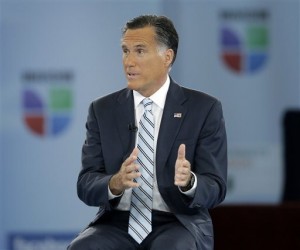By Tom Kozlowski
Opinions Assistant
Mitt Romney is a man of small matters. He can handle a state, but a country is unwieldy. He can manage several businesses, but macroeconomics is a maelstrom. Yet, there’s a constant urge, an obligation, a paranoia for Romney to pretend — to know what he doesn’t know, says Socrates. There’s a world of understanding outside his window, but Romney hides inside studying the papier-mâché globe on his desk.

His campaign is outside, though. They’re constantly on patrol for damage control, sweeping up broken glass from his Olympic blips in July, putting out flames from his comments on Latinos and rebuilding his public approval (as long as the public isn’t part of that disgusting 47 percent). How long can they chase their candidate’s bull in a china shop? Or more likely, will there be anything left of the campaign to pick up?
By now, the odds are slim. Romney knows what he wants to know and assumes the rest will float in the Tea Party’s ilk. But that doesn’t mean his positions are right. When Romney encounters a problem at close range — either cats stuck in trees or private equity firms — he can analyze it well with a magnifying glass. But when forced to examine the big picture, he’s absentmindedly gazing through a kaleidoscope.
For Romney to be president, he should first have a decent comprehension of the country he’s running, let alone the people he serves. According to the man himself, he can barely understand nearly half of the American population. The governor let his wealthy fundraisers know where his sympathies lay in a recently released video. Because 47 percent of Americans do not pay income taxes, Romney pretends that their lives are vats of government dependency, shallow goals mucked in irresponsibility. The stereotypical rich people clapped their hands. Congratulations. But his empty knowledge just called out the elderly, the military and blue collar workers. Hey, he didn’t know.
But social policy isn’t all the president packs in the quiver. There needs to be some developed thoughts on how to cope with the nations forever ensnared in our affairs, or what we call foreign policy (America is not the only country on earth, and its economy often depends on, shockingly, the rest of the world). Romney’s strategy was to focus on the economy. Now that 99 global problems are on his doorstep, blindly avoiding them is no longer one. Instead, he can speak about them blindly, hoping his archenemy Russia sparks a sequel to the Cold War.
Rebutting much of Romney’s foreign policy is difficult when it doesn’t exist. But when it does poke its head from under the covers, it’s no pretty sight. Consider just a few quirks: on Iran, the candidate spoke of its mullahs as “crazy people” using dirty bombs, a point neither diplomatic nor correct according to radiologists. He dribbled details on Afghanistan only when pressed, and they seem conveniently aligned with President Obama’s withdrawal plans (despite that the Obama administration is always wrong, right?). Even further, as a businessman, Romney believed it would be best to enflame trade restrictions on China, our nation’s biggest debt creditor, our supplier of cheap goods. This field is where Romney’s private sector career should be most adept. If punching up American interest rates and wounding the markets he so salivates to protect is protocol, then let him continue to defy the economists. Let him continue to reject his own experiences — there’s a better candidate running. Hey, he just doesn’t know.
So, it’s safe to say there are a few dents in the candidate’s armor. That’s not to say that Romney’s a bad person, an unintelligent person or a malicious Mr. Burns throwing America under the bus. He is simply looking beyond the grand scheme of the world for the narrowed interests of the far right. He simply knows what he doesn’t know. And he’ll stand by what he’s said — “whatever it was.”






